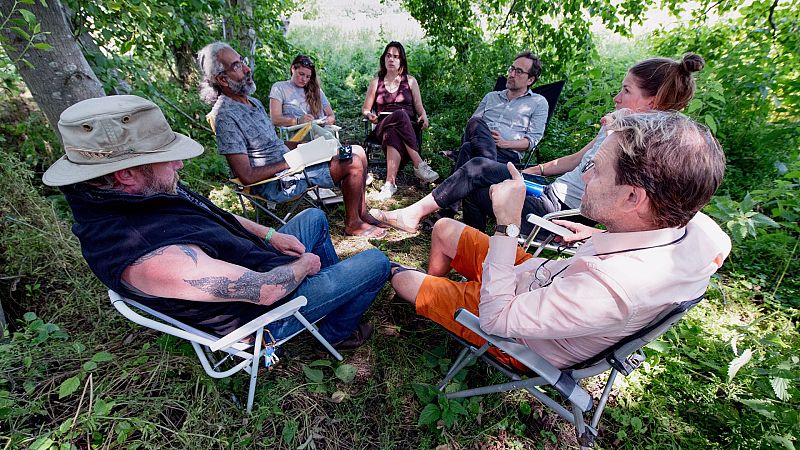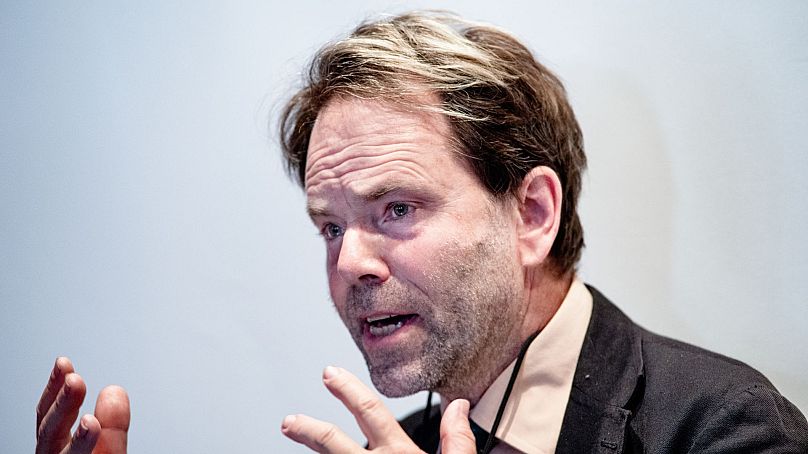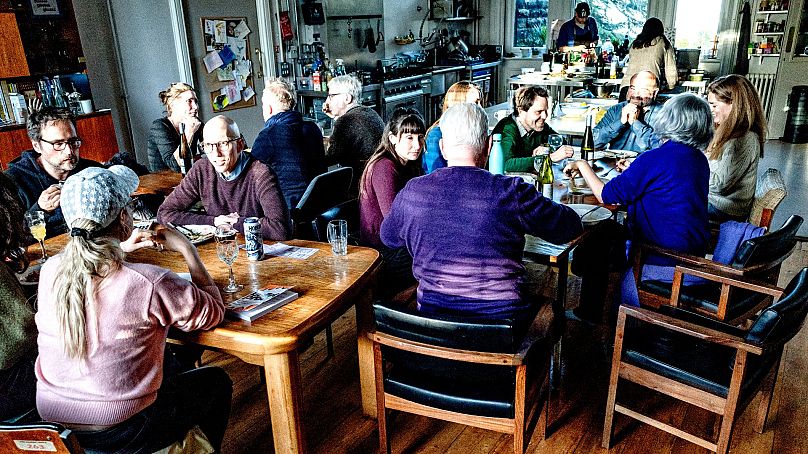'Harness the power of nightmares’: How facing up to the climate reality could help us fight it

“When people ask me, ‘What can I do as an individual about the climate?’, I reply: ‘Don’t be an individual - work together with others,” says Rupert Read, co-director of the Climate Majority Project.
Statistics show that the vast majority of people in Europe care about the climate crisis: more than half of European voters believe it should be a priority while only 16 per cent see it as a secondary issue, according to a Euronews-Ipsos poll conducted ahead of this year’s EU elections.
The problem is, most of us don’t know what to do about it.
After decades of committed climate action - from being a political strategist for Extinction Rebellion to a councillor for the Green Party of England and Wales - Rupert’s sole focus is now the Climate Majority Project.
He is on a mission to rally the silent masses into action: “A bit like a war effort… this is about everybody,” he says.
How can we fight the climate crisis together?
“Sometimes people get put off because they think, ‘I'm not committed enough’ or ‘I'm not pure enough’” - but you don’t need to organise climate protests or quit flying to make an impact, Rupert says.
Individual actions are “only one tiny part of the jigsaw... Much more important is what we do together.”
Whether it's monitoring flood risks with your neighbours, rewilding with people from your place of worship or leveraging your professional skills and network, collective action has the power to move the needle, Rupert asserts.
“When you get enough of all of this adding up… the idea is to eventuate in change at the national and international level.”
Ultimately, he says, it’s down to governments to help us make greener choices, for example by incentivising green modes of transport and disincentivising air travel.
But for this to happen, the silent majority need to find their voice.
“We want to create a future in which governments are running towards doing the right thing, in which politicians are falling over themselves to have the stronger policies on climate and nature,” says Rupert.
“There is no way forward on this without the majority of people… We have to do it together. And part of that crucially, absolutely involves collectively pressuring governments to do the right thing.”
In the meantime, community climate action brings its own benefits.
“When you build community together, when you prepare for disasters together, when you grow food together, when you create more local resilience, then you're creating a better life,” says Rupert.
‘Businesses should be lobbying for climate regulation’
Business leaders also have a key role to play, as they wield immense power over government - especially through trade associations and lobbying.
“Up to this point, business and financial interests have tended to be a drag on doing the right thing. They've looked for regulatory loopholes, they've said, ‘Don't put too much of a burden on us’,” says Rupert.
However, many are starting to wake up to the fact that “there are no profits on a dying planet”.
This has led to a boom in environmental standard setting, disclosure and accountability - but, again, individual actions are not enough, says Rupert.
He envisions a future in which businesses use their collective power for good: “Rather than lobbying for lower taxes and tax loopholes, imagine if businesses lobbied together and asked governments to regulate them on climate and nature… That would be a true game changer.”
This would prevent “good actors” who are upholding higher environmental standards from being undercut by “bad actors” - and is the key message of the Climate Majority Project’s ‘Regulate Us Better’ campaign.
It would also create new opportunities for business owners.
“There are lots of win-wins and co-benefits here,” says Rupert. “Jobs in retrofit, public transport, green energy, for example - all of these are massive opportunities that require investment and that investment will deliver a return,” he adds, pointing to the economic benefits delivered across the US by Biden’s Inflation Reduction Act.
Is it too late to avoid the worst effects of climate change?
Key to all of this is being honest about where we’re at in terms of the climate and nature emergency.
Whether well intentioned or with a hidden agenda, “Many influential people, including politicians and business people… have insisted that we can and must and will stay below 1.5 degrees [of warming] even as we now start to actually literally blast beyond it,” says Rupert.
“And that is very unhelpful because it’s a denial of reality. That's the kind of thing that we used to castigate the climate deniers for.”
Signed by nations around the world in 2015, the UN’s Paris Agreement aims to limit global warming to 1.5°C above pre-industrial levels - a threshold considered the safe zone for preventing the worst effects of climate change.
But June 2024 marked the 12th consecutive month that global temperatures surpassed this threshold, raising fears that it’s no longer viable in the long term.
“Coming to terms with that moment of leaving that safe zone is an immensely powerful thing for humanity,” says Rupert.
“The painful letting go of that target… is very difficult, but emotions have a power which we should harness: the power of grief, the power of fear, the power of anger, the power of nightmares.”
Facing up to this reality, he says, could energise us to seriously prepare for what’s ahead through strategic adaptation, resilience building, and resourcing those worst affected in the Global South - including funding loss and damage.
Through its incubator, Climate Majority Project provides funding and expertise for citizen climate action initiatives. Head to the website for tips on how to take action and to learn about upcoming gatherings on climate adaptation and resilience.



